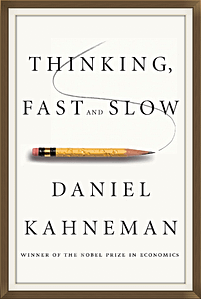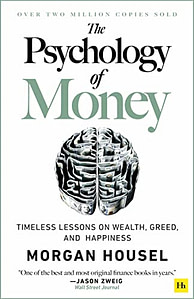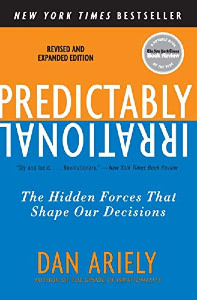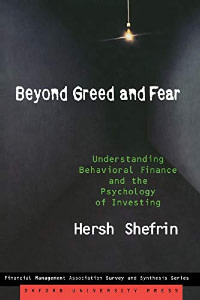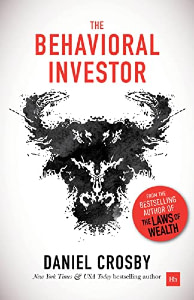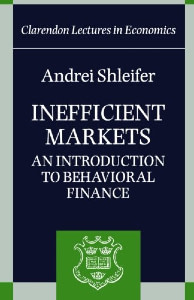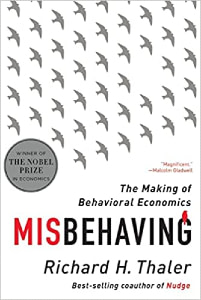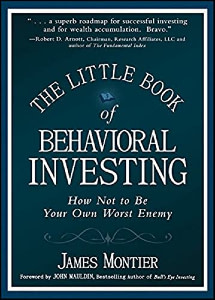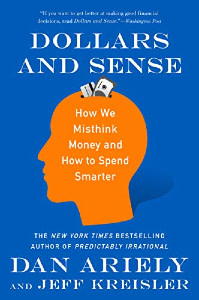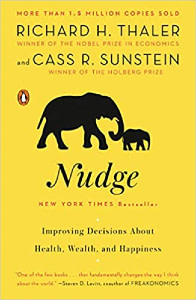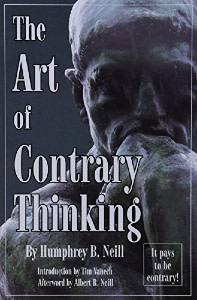Traders typically let feelings and biases information their monetary selections, main them to make careless errors. People managing their private funds additionally ceaselessly put purpose and details within the backseat.
How will you change into extra aware of danger, act in your greatest curiosity, and forestall feelings and biases from getting one of the best of you? Behavioral finance books will help.
The next titles will train you make rational selections and fewer errors, whether or not you’re managing private finance or investments.
by Daniel Kahneman
Considering, Quick and Gradual (2011) by Daniel Kahneman is among the many greatest funding books for freshmen. It delves into cognitive biases and folks’s two conflicting modes of considering: intuitive and deliberate.
It explains how processing data instinctively could be useful however typically results in errors in judgment. Placing feelings apart and permitting time for logical reasoning will help you make rational selections.
🔑 Key takeaways:
- Instinct and deliberation in behavioral economics;
- How overconfidence causes biased, subjective selections;
- Objectively processing and responding to statistical data;
- Prospect concept.
This best-seller’s major themes are the exploration of many cognitive biases and heuristics. Seize your copy to know overcome them and take cost of your monetary habits.
✍️ Concerning the creator: Daniel Kahneman is a world-renowned psychologist and economist well-known for his findings on behavioral economics, which earned him the 2002 Nobel Prize in Financial Sciences. He developed prospect concept, co-founded TGG Group, and teaches psychology and public affairs at Princeton College.
A Rouge Economist Explores the Hidden Aspect of The whole lot
by Stephen J. Dubner & Steven Levitt
Freakonomics (2005), by Stephen J. Dubner & Steven Levitt, is an uncommon ebook that correlates economics and sociocultural phenomena. It explains methods so that you can apply financial concept to quite a few seemingly unrelated topics, together with popular culture.
The ebook additionally discusses controversial concepts like abortion and gun violence, for which it has obtained criticism. Nonetheless, the authors tie them again to financial rules with behavioral arguments.
🔑 Key takeaways:
- Financial information can appropriate the irrational habits governing our lives;
- We’d like economics to know human habits;
- Nature and nurture have an effect on how individuals behave;
- Liberating your self from typical considering could make you a greater economist.
Freakonomics may be a difficult learn, however it’s value it in case you are something however conventional.
✍️ Concerning the authors: Steven Levitt is an economist who received the John Bates Clark Medal in 2003. He co-founded TGG Group and the Heart for RISC on the College of Chicago, the place he works as an economics professor.
Stephen J. Dubner is a journalist, creator, and host of the Freakonomics Radio podcast. He co-authored a number of Freakonomics sequels and has obtained many awards for his journalistic work.
Timeless Classes on Wealth, Greed, and Happiness
by Morgan Housel
The Psychology of Cash (2020), by Morgan Housel, isn’t your unusual behavioral finance ebook concentrating on investing and sensible ideas. It focuses on perceptions of cash and their impression on monetary decision-making.
The ebook accommodates 19 brief tales that broaden our understanding of economics, wealth, greed, success, and happiness, highlighting the impression of psychology on monetary selections.
🔑 Key takeaways:
- Be cheap as an alternative of rational;
- Embrace market volatility;
- Get monetary savings and watch for profitable alternatives;
- Depart your ego out of the equation;
- Fastidiously plan investments and subsequent steps as a result of not all methods are profitable.
This participating learn additionally tackles private finance administration, instructing the readers concerning the significance of smart spending and financial savings selections on the journey to wealth.
✍️ Concerning the creator: Morgan Housel is a monetary journalist and behavioral finance professional who used to jot down for the Wall Avenue Journal and the Motley Idiot. He’s a companion on the Collaborative Fund and has received quite a few awards, together with the SABEW’s Greatest in Enterprise Award and the New York Instances Sydney Award.
The Hidden Forces That Form Our Selections
by Dan Ariely
Predictably Irrational (2008), by Dan Ariely. is a superb ebook for newbie traders and college students learning behavioral finance. It reads like a narrative, containing private anecdotes from on a regular basis experiences to assist readers delve into an investor’s thoughts.
Ariely makes use of thrilling experiments and real-life examples to indicate how individuals act irrationally, even when deliberately attempting to make a rational resolution.
🔑 Key takeaways:
- Irrational habits is systemic and predictable;
- Feelings stand in the best way of fine judgment;
- Folks put extra worth on free merchandise than they really have (the zero worth impact);
- We overvalue owned objects because of emotional biases (the endowment impact);
- Predicting irrational habits will help consider market sentiment.
Moreover its priceless funding classes, this ebook accommodates examples demonstrating that many individuals don’t use rational thought when evaluating costs. As an example, we could count on a dearer drugs to be simpler than its inexpensive counterpart, even when each are placebos.
Get your copy in case you are on the lookout for a thought-provoking learn which may assist you change into extra rational with funds.
✍️ Concerning the creator: Dan Ariely is a psychology and behavioral economics professor at Duke College, the place he runs the Heart of Superior Hindsight analysis lab. He taught at MIT, co-founded a number of corporations specializing in behavioral science, and has printed a number of best-sellers, together with Predictably Irrational and The Upside of Irrationality.
Understanding Behavioral Finance and the Psychology of Investing
by Hersh Shefrin
Past Greed and Concern (1999), by Hersh Shefrin, seems to be at how psychology influences monetary selections. Shefrin teaches traders forestall feelings, bias, and overconfidence from clouding their judgment.
The ebook delves into how we let errors improve our worry with out studying the teachings these errors can train. After we assume we see revenue, we change into grasping and make the identical errors over and over. Traders can overcome the cycle of greed and worry by recognizing and avoiding cognitive biases and errors.
🔑 Key takeaways:
- The ideas of heuristic biases, body dependence, and market inefficiency;
- Even seasoned professionals let feelings and cognitive biases information their actions;
- Funding fashions don’t think about these elementary parts of human habits;
- Ignoring the results of the psychology of investing results in errors and monetary losses.
It’s possible you’ll tie this ebook’s themes to buying and selling, however its major focus is investing.
✍️ Concerning the creator: Hersh Shefrin is an economist specializing in behavioral finance. He’s a finance professor at Santa Clara College, the place he beforehand taught economics, and writes for the Wall Avenue Journal, Forbes, Vox, and Huffington Submit. He has printed many analysis articles and books and received the Albert Nelson Marquis Lifetime Achievement Award in 2019.
by Daniel Crosby
The Behavioral Investor (2018), by Daniel Crosby, is among the many prime must-read books for traders. It delves deep into connections between human nature and finance and presents sensible ideas for higher monetary habits and better returns.
This ebook will help you improve self-awareness, keep away from frequent funding pitfalls, overcome pure inclinations, enhance your portfolio administration and construct wealth.
🔑 Key takeaways:
- The psychological, neurological, and sociological components impacting your funding selections;
- The 4 psychological tendencies (ego, conservatism, consideration, and emotion) influencing funding habits;
- Sensible options to those issues and wealth administration ideas.
The creator additionally proposes a rules-based behavioral investing (RBI) technique for transferring away from emotional biases and towards rational, evidence-based decision-making.
✍️ Concerning the creator: Daniel Crosby is a psychologist, asset supervisor, and behavioral finance professional serving to corporations maximize funding returns and construct wealth. He’s a thought chief writing for Funding Information and WealthManagement.com and producing the “Irrationality Index,” which measures greed and worry to forecast unfavourable returns.
An Introduction to Behavioral Finance
by Andrei Shleifer
The environment friendly market speculation (EMH) states that asset costs mirror all obtainable data and have honest elementary values. It assumes that every one traders are rational and that pricing discrepancy is not possible because of arbitrage alternatives.
That isn’t the case with real-world monetary markets. Institutional and psychological proof problem the EMH’s assumptions.
In Inefficient Markets (2000), Andrei Shleifer proposes behavioral finance as a substitute, presenting empirical proof and theories for analyzing precise markets.
🔑 Key takeaways:
- Actual-world monetary markets are inefficient;
- Traders make irrational selections because of cognitive biases;
- Behavioral finance helps precisely analyze monetary knowledge and forecast asset costs.
This ebook is a superb learn for freshmen in behavioral finance. The creator’s simply intelligible explanations of varied monetary market fashions assist newbies perceive and apply the information in actual life.
✍️ Concerning the creator: Andrei Shleifer is a monetary, behavioral, and growth economist, researcher, and creator. He received the John Bates Clark Medal in 1999, co-founded LSV Asset Administration, and taught at Princeton College and the College of Chicago. He has been an economics professor at Harvard College since 1991.
The Making of Behavioral Economics
by Richard H. Thaler
Richard H. Thaler’s titles are among the many most useful behavioral finance books. The Nobel laureate’s Misbehaving (2017) is a gripping ebook you’ll wish to learn in a single sitting as a result of the knowledge and sometimes humorous illustrations received’t allow you to put it down.
Thaler explains how individuals ceaselessly make irrational monetary selections as a result of they let emotional biases information their actions. They misbehave, and markets transfer irrationally consequently.
🔑 Key takeaways:
- Traders are irrational and misbehave due to emotional biases;
- Misbehavior can have detrimental penalties;
- Behavioral economics supplies a brand new lens to research financial concept;
The creator’s private experiences make the ebook much more participating. Seize your copy if you need an entertaining and insightful learn that may assist you make wiser monetary selections.
✍️ Concerning the creator: Richard H. Thaler is a behavioral economist, creator, and columnist for The New York Instances. He received the Nobel Prize in Financial Sciences in 2017 for excellent contributions to behavioral economics. He has been an economics and behavioral science professor on the College of Chicago’s Sales space Faculty of Enterprise since 1995.
How To not Be Your Personal Worst Enemy
by James Montier
The Little Guide of Behavioral Investing (2010), by James Montier, explains how human habits impacts monetary markets and presents pointers on sustaining a worthwhile funding portfolio.
The creator shares insights into traders’ psychological pitfalls, comparable to feelings, hindsight bias, loss aversion, and overconfidence, and presents options to keep away from them. He additionally explains the importance of studying from errors and overcoming behavioral challenges.
🔑 Key takeaways:
- Cautious planning helps keep funding self-discipline;
- Guesswork and failing to study from errors can result in losses;
- Specializing in low-risk property helps overcome the worry of creating funding selections;
- Monitoring worth fluctuations will help you make worthwhile selections;
- Elementary evaluation is essential to find out honest market values.
This brief learn is right for aspiring traders dipping their toes in monetary markets. It presents a helpful basis for making psychology work in your favor and breaking the boundaries hindering excessive returns.
✍️ Concerning the creator: James Montier is a famend economist with a number of behavioral and the creator of a number of investing books. He’s a fellow of the Royal Society of Arts and a visiting fellow on the College of Durham. He was the co-head of Common Technique at Société Générale and presently works as an asset allocation supervisor at GMO.
How We Misthink Cash and The right way to Spend Smarter
by Dan Ariely & Jeff Kreisler
{Dollars} and Sense (2017) is a page-turner that dives into the irrational world of private finance and supplies steerage on overcoming behavioral challenges. It’s a sensible choice for the reader who’s extra centered on private finance than on investing.
The authors discover on a regular basis matters to assist us perceive how feelings have an effect on our monetary selections and should price us greater than we expect. They focus on how we understand cash and tackle the tendencies driving us to spend greater than we must always, from utilizing bank cards for groceries to overpaying for objects on trip.
🔑 Key takeaways:
- How psychology impacts your monetary selections;
- The right way to change your instincts for higher monetary decision-making;
- Sensible recommendation on enhancing monetary selections, together with spending and saving extra correctly.
This satisfying learn explains behavioral finance in an easy-to-understand language, infusing humor into real-life examples to assist readers relate. It’s a fascinating behavioral finance ebook for freshmen.
✍️ Concerning the authors: Behavioral economist Dan Ariely has partnered with Jeff Kreisler, a lawyer, creator, slapstick comedian, and behavioral science advocate. Kreisler is head of Behavioral Science at J.P. Morgan Chace, founding editor at PeopleScience, and an government humor coach at Stanford Enterprise Faculty.
Bettering Selections About Well being, Wealth, and Happiness
by Richard H. Thaler & Cass R. Sunstein
Nudge (2008) is a improbable learn concerning the behavioral patterns that lead us to poor monetary selections, negatively affecting our well being, wealth, and happiness. It supplies real-world situations and ideas to enhance our monetary habits.
The authors clarify how individuals succumb to biases when making monetary selections and share enlightening examples from intensive analysis on behavioral science.
🔑 Key takeaways:
- “Alternative structure” can change client habits by “nudging” individuals in the precise path with out limiting choices;
- Even a minor change can “nudge” individuals to make higher selections;
- Utilizing the nudge concept to revamp the environment will help us stay higher lives.
The authors have rewritten this New York Instances best-seller to share new analysis and private experiences. Nudge: The Last Version (2021) supplies insights on private finance, bank card debt, mortgages, retirement financial savings, local weather change, medical care, and different areas the place we are able to make higher selections for a extra fulfilling life.
✍️ Concerning the creator: Behavioral economist and Nobel laureate Richard H. Thaler has teamed up with authorized scholar Cass R. Sunstein in a collaboration for Nudge. Sunstein labored for the Obama administration, received the Holberg Prize in 2018, and taught on the College of Chicago Legislation Faculty. He presently teaches at Harvard Legislation Faculty because the Robert Walmsley College Professor.
Paradoxes and Anomalies of Financial Life
by Richard H. Thaler
The Winner’s Curse (1991) is an interesting exploration of irrational financial habits. Thaler tackles many paradoxes and anomalies of on a regular basis financial life, explaining a standard phenomenon in monetary markets and worth auctions: the winner’s curse.
The winner’s curse is an financial anomaly indicating that the winner can be a loser as a result of they overestimate an merchandise’s worth and sometimes overpay for it.
Thaler shares many real-world examples to assist his knowledge, together with public sale bidders and customers saving cash on one product to spend the financial savings on one other.
🔑 Key takeaways:
- Why individuals make irrational monetary selections;
- Financial paradoxes and anomalies, primarily the winner’s curse;
- Monetary markets are inefficient.
This ebook could reveal important financial knowledge, however it’s barely difficult for readers with no background in economics. It’s a dense ebook with many mathematical examples that make it superb for tutorial readers.
by Humphrey B. Neill
Do you observe the pack as an investor or select an oppositional course? The previous could be dangerous, in accordance with the late Humphrey B. Neill.
“When everybody thinks alike, everyone seems to be incorrect.”
This pearl of knowledge is certainly one of many this famend economist mentioned in The Artwork of Opposite Considering (1976). He defined the results of herd mentality on funding selections and monetary markets and proposed a distinct considering philosophy he utilized when doing enterprise or investing.
Opposite considering will help traders seize the rising worth from others following of their footsteps. It will possibly additionally assist forecast market shifts and forestall monetary losses.
🔑 Key takeaways:
- The herd is often incorrect;
- Opposite considering will help you keep heading in the right direction;
- An oppositional technique will help you forestall or reduce losses.
This ebook provides you a components for considering like a profitable investor, making higher selections, leveraging worth, understanding how individuals behave, and producing correct forecasts. It’s nonetheless a related learn after practically half a century.
✍️ Concerning the creator: Humphrey B. Neill was an economist, funding thinker, and World Struggle I lieutenant. He devoted his life to analyzing and writing concerning the folly of herd mentality and its results on funding selections. All the time encouraging individuals to query the consensus and offering mountains of proof, he earned the title “father of opposite opinion” from Life journal.
Conclusion
These behavioral finance books deserve a spot on each financially centered bookshelf, from traders and asset managers to people searching for private finance recommendation.
Their knowledge and real-world examples could be priceless instruments for worthwhile investments and higher financial selections devoid of feelings and biases.



